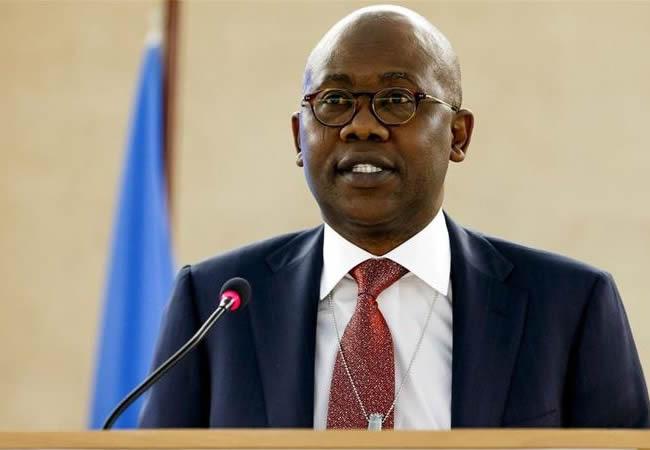BY ABDULLAHI MOHAMMED
The tenure of Mohammed Bello Adoke SAN, CFR, as Nigeria’s Attorney General and Minister of Justice was a period defined by high-stakes constitutionalism, profound legal reform, and contentious pragmatism. His time in office can be appraised as that of a reformist statesman who, operating from a philosophy of pragmatic problem-solving, willingly stepped into the nation’s most intractable legal and political crises. Adoke’s legacy is fundamentally shaped by his role as the legal architect who navigated an unprecedented constitutional breakdown. During the prolonged illness and absence of President Umaru Musa Yar’Adua, Nigeria teetered on the brink of a power vacuum that threatened its democratic stability. Adoke positioned himself as the key legal mind behind the “Doctrine of Necessity,” a creative and courageous constitutional intervention. By providing the legal framework that empowered the National Assembly to lawfully transfer power to Vice President Goodluck Jonathan, he averted potential chaos or military intervention, an act of constitutional statesmanship that preserved the integrity of Nigeria’s democracy and stands as arguably his most significant achievement.
Beyond this critical intervention, Adoke drove a visionary agenda of institutional and legal reform that has left an indelible mark on Nigeria’s justice system. He was the driving force behind landmark legislations designed to reshape the very fabric of Nigerian jurisprudence. The Administration of Criminal Justice Act (ACJA) of 2015, a monumental piece of legislation he championed, sought to unify criminal procedure, eliminate the debilitating delays that plagued the system, and promote human rights by tackling the scourge of prolonged pre-trial detention. Concurrently, his tenure saw the successful enactment of the Freedom of Information (FOI) Act in 2011, a transformative law that, for the first time, legally empowered Nigerian citizens to access information held by public bodies. This act represented a paradigm shift towards transparency and accountability, fundamentally altering the relationship between the government and the governed. These were not mere policy adjustments but foundational reforms that laid a new legal bedrock for combating corruption and improving governance, with an impact destined to outlast his administration.
In the volatile arena of international litigation, Adoke adopted the role of a staunch and strategic defender of Nigeria’s economic interests. He approached multi-billion dollar disputes with a calculated mindset aimed at protecting the national treasury. As documented by history, he vigorously defended Nigeria from the outset against what he characterizes as the predatory agreement in the now-infamous P&ID case. His management of other complex disputes, such as those with the Paris Club lenders and the settlement of long-running oil block disputes, was consistently framed by a desire to avert crippling financial penalties. He presented himself as a pragmatic guardian of the public purse, making difficult calculations to settle cases where he believed it was the lesser of two evils to avoid larger liabilities, while fighting others he deemed unjust. This strategic approach cast him as a key figure in shielding the nation’s economy from potentially devastating international arbitration awards.
The most definitive, yet deeply contentious, example of this pragmatic approach was his handling of the OPL 245 Malabu affair. From his perspective, he inherited a “Greek Gift”, a toxic and legally entangled dispute that had festered for over a decade, ensnared three successive governments, and scared away vital foreign investment. His legal advice was that the most prudent path was a government-brokered settlement, with the Nigerian state acting as a constructive trustee or conduit for funds to resolve the competing claims between Malabu Oil and Gas and the international oil companies, Shell and ENI. Adoke maintains that every action was based on explicit presidential directives and collective approvals from the Federal Executive Council, arguing that his role was not to be a party to the commercial deal but to provide a legal pathway to resolve a crisis. He frames the outcome as a difficult but necessary act of political triage that secured a $210 million signature bonus for the state and averted a massive breach-of-contract lawsuit Nigeria was likely to lose, thereby cleaning up a legacy problem that was a stain on the nation’s investment climate.
Advertisement
Another unsung legacies of Adoke’s giant strides is his unalloyed intervention and the role he played as a pragmatic advisor who reinforced the path of concession. By advising President Jonathan that the election outcome was a reflection of the people’s will (even though questionable instances of rigging were abound) and that a graceful acceptance of defeat was the most constitutionally sound and stabilizing course of action, Adoke helped provide the legal and ethical justification for the unprecedented move. This counsel was instrumental in creating the environment and boosting the morale, for President Jonathan’s famous phone call to Buhari, in which he conceded and offered congratulations. Adoke’s actions in this critical moment were a direct extension of his documented philosophy of prioritizing national interest over partisan politics, thereby helping to avert a potential political crisis and cementing a landmark moment for Nigeria’s democracy.
Underpinning these high-profile actions was a concerted effort to restore a sense of professionalism and legal rigor to the Office of the Attorney General. Adoke portrays himself as a professional lawyer focused on the technicalities of the law, relying on the advice of career civil servants and attempting to insulate his office from the corrosive effects of raw political pressure. In a favourable light, his tenure was that of a brilliant legal mind who was willing to bear the immense “burden of service.” This involved making politically perilous decisions to resolve deep-seated national crises, from constitutional breakdowns to legacy commercial disputes. Consequently, the subsequent legal battles he faced can be interpreted as the unfortunate price paid for executing his duties with a resolve to tackle Nigeria’s most intractable problems, leaving behind a legacy that is as impactful as it is debated. Indeed, in Adoke, was and still is, a leader Nigeria owes gratitudes! May the sun shine tomorrow…
Mohammed is a Social Commentator and writes from Abuja, Nigeria.
Advertisement
Views expressed by contributors are strictly personal and not of TheCable.
